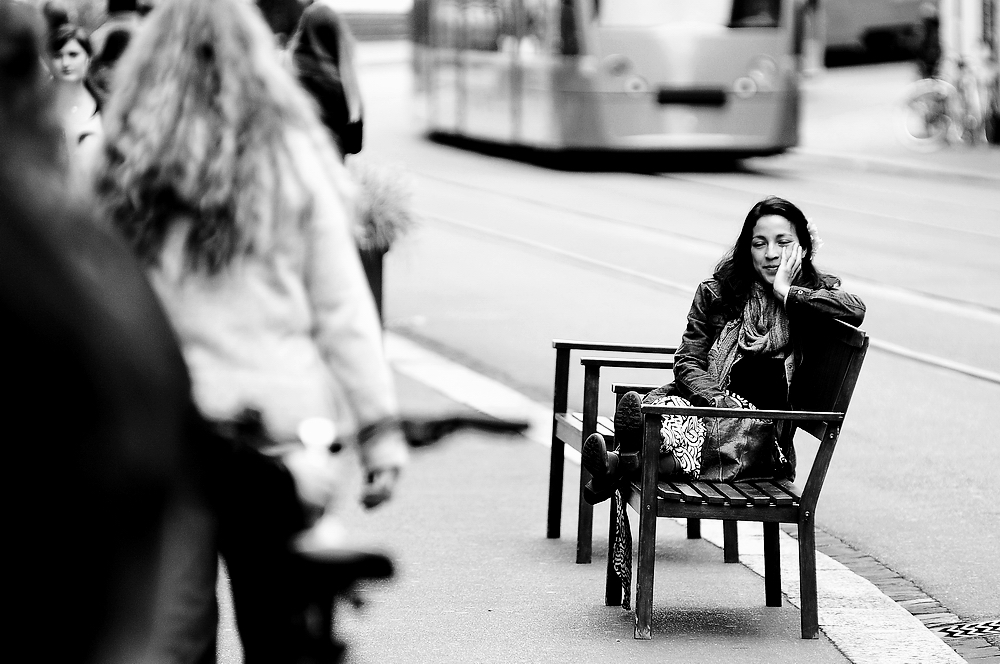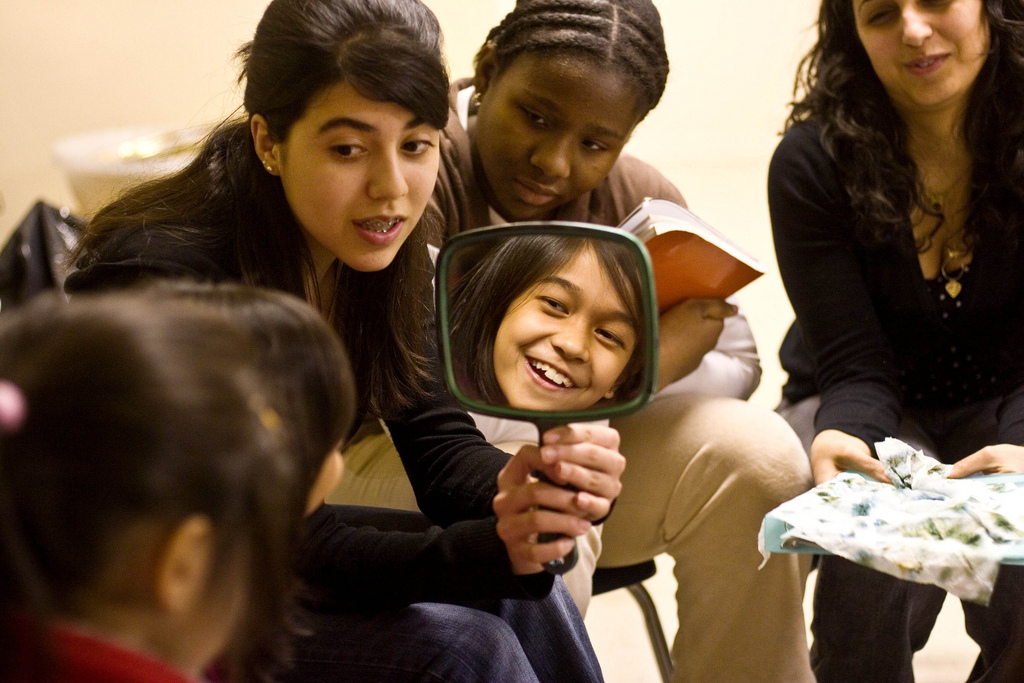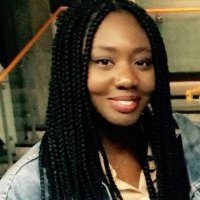Hi Tracey, to begin with, tell us a little bit about yourself?
You know, I never know how to answer that question. In a way, I am quite sceptical because I find it hard to give you a snapshot of myself in so many words. What part of me do I choose to reveal? Which parts of my life do I consider important at this particular moment and which experiences do I disregard? I think if you asked me this question everyday, you would get a totally different answer each time. You can tell that I do great at job interviews!
Where are you from and what impact do you feel this had shaping your identity, in terms of gender and race?
My parents came from Ghana to France where they started a family. My brothers and I were raised in a bilingual household. We spoke two languages and sometimes even combined the two. From a young age, language and culture both played a big part in shaping my identity. As a child, I lived in a neighbourhood where the majority of my friends were Congolese, Egyptian and Senegalese, as a result, race did not play a factor, but ethnicity did.
To be honest, I did not start thinking about race and/or gender until I experienced explicit racism for the first time, which was around the age of 13. And to be honest, I still do not fully comprehend how that moment has impacted my life because I still relive it every now and then. It has stayed with me and I doubt it will ever go.

And how has this developed since moving to Brussels?
I do not know whether it has developed, but I am more aware of who I am and who I want to be since coming to Brussels. As the heart of the European Union, I had the perception that I would see all kinds of people here, but I think I overestimated the Brussels bubble. The only time race is discussed is when racism is being acknowledged, and I think this is where we are going wrong, we have not established the differences between race, racism, ethnicity and skin colour and use these words as if they are synonyms. Race is perceived as something that is taboo, many are scared of the word because they do not want to come across as ‘racists’ and as result it is marginalised, and I along with it. And I think that this denial is a privilege for the Brussels bubble and for many parts of Europe too.
Who, or what, was your main inspiration for the Fluidity series?
My main inspiration for the Fluidity collection has been my life and the people in it. The relationship I have with my mother as well as the women in my family have played a critical role in this literature. In a way, Fluidity was created for them and by them. The theme of coming-of-age is evident throughout this body of work, I explore and address the spaces and identities I have chosen to inhabit and the ones which are ‘expected’ of me across my childhood, teenage years and adulthood.
The bond between first and second generation West African immigrants living in Europe is also something which inspired me to write Fluidity. We are mostly exposed to a particular immigration story when it comes to Africa and Europe, and I wanted to write about my story of immigration which is of living in the ‘in-between’, which is of having one foot in and foot out.
What were you trying to convey with the Fluidity series ?
When it comes to my writing, it is never my intention to convey the reader. Of course, there are recurrent themes in this collection. Fluidity does indeed explore race, skin colour and racism as well gender and feminisms, culture and other issues, but not in a way that is supposed to convey or persuade the reader to think in a certain way. I want people to read the poems and interpret them individually in order to start a dialogue.
I always wonder why as humans, we always seek to find a reason behind everything. I believe that not every question has or deserves one single answer, and my poetry is just that. There is no right or wrong, or a single concrete answer to understanding my work.
And as for young Europeans like myself, our future is uncertain. Let’s be honest, we turn left, we see populism, we turn right, we bump into xenophobia, and if we choose to go straight ahead we head towards youth unemployment and so on.
What steps do you think need to be taken to make European feminism more inclusive and intersectional?
2016 has been the year of ‘intersectionality’, you cannot imagine how many rooms I have been in, where someone has expressed the importance of, and the need for ‘diversity and intersectionality’ within the feminist movement and yet when I look around the room, I am the only black woman. An obvious step would be to look and see who needs to be part of the conversation? Who needs to be in the room? Who needs to be represented? Who needs to be heard? Who needs to be seen?
And this goes beyond being the ‘only one’ in the room, which I discuss in Fluidity, or inviting someone to talk about their experiences. Let these people be part of the implementation and not a poster child for your mission.
The intersectional theory is coined by US civil rights advocate and scholar Kimberlé Williams Crenshaw. The US have done some incredible work on the patriarchal and hierarchical nature of power and how inheriting multiple identities can result in one’s issues being ignored. However, Europe also needs to also look at its own backyard. We need to not only shine light on our own academics and activists but also stop acting like racism and sexism is worse across the Atlantic, therefore ‘it’s not as bad’. Our histories are different, therefore our realities are different.
We have this tendency of looking to the US when it comes to race. Quick and subtle example, You know when I type black women on google search and select the ‘news’ tab the majority of the content are based in the US, and same goes if I search it in French and in Spanish.
European feminism has become more representative and inclusive. Many, like myself for example, could not see themselves or even subscribe to this closed membership which only allows certain types of individuals into the feminist club, and as a result we created our own versions what it means to a be a feminist.

What are your thoughts on pivotal events like Brexit, for you as a European migrant in the UK, and the suspenseful run-up to the French elections as a young, what are your thoughts of the future of the position of young Europeans in this climate?
To be honest having lived in Britain for over ten years, I was not really shocked about Brexit. The day of the results, I was told to go ‘home’ and I expected it. In a way, I was ready for it. And it is strange because when I called my cousin in New York, the morning after the US election, he too was not surprised about the outcome.
For many of my friends, Brexit was a wake-up call, they woke up to a new Britain which did not feel like their own home, but for others Brexit started in their childhood, adolescence or even in their adulthood. So I guess, it was pivotal, but it was not an event because it has been happening across generations. The truth is, we still live in a society which reacts to issues only when it affects the mainstream and Brexit was an indication of this.
The French elections will be key for all of us! And my key thought is the necessity to remind ourselves of what has taken place over these past years and think critically about the kind of country we want to live in. Let us re-analyse about the kind of people and media we choose to read and believe before voting.
And as for young Europeans like myself, our future is uncertain. Let’s be honest, we turn left, we see populism, we turn right, we bump into xenophobia, and if we choose to go straight we head towards youth unemployment and so on. Yet at the same, we are being told to be the pillars of a fairer, progressive and diverse generation who should not be disheartened by the errors made by past generations.
We are, to some extent, in limbo, and that’s where we are going wrong. Why are we choosing to focus on what young people could be, because we already are talented, intelligent and driven. We do not need to turn 40-years-old to be considered a ‘credible source’, we can add just as much value, creativity and skills than anybody else. Leadership and experience has no age limit. We offer a different kind of wisdom that may not be necessarily be based on age but is nonetheless indispensable.
There is indeed room for us to grow, in this harsh climate, but how can we when the space is already taken up by people who will not step aside and continue to speak on our behalf and yet look, sound and think nothing like us? So I urge the institutions to listen carefully and stop painting this unrealistic picture of what they call ‘youth’ because we can offer so much more than internships, traineeships and forums. We want and deserve a seat at the table.
Below you may find Tracey Agyeman’s Fluidity Series originally published by the European Women’s Lobby:
FLUIDITY// DISCOVERY OF THE SELF #1
06:00
Limbo.
Black and/or African.
Never French.
Let Alone European.
My translations in yolk and white.
08:20
Identities travel through me, but never by me.
I don’t know who they want me to be today, so I wait patiently.
I hang my private-self before closing the door to become ’her’.
As fresh as the boat which swept ’her’ here, I stand in the line of the Western Union.
Leaving for the in-between.
08:45
He asks ’her’ to smile because ’pet you look prettier when you smile’.
09:30
She looks at ’her’ in awe, ’where are your dreadlocks gone?’
09:35
At an acute glance,
’Is your afro like a pillow when you sleep?’
Through ’her’ smile, she gnashes her teeth against her Blue Magic gums.
Anger is not a reaction but an expectation.
17:00
Uniform hanged.
21:35
I lie awake,
alone in my identities.
21:40
When does my race begin and gender end?
23:50
It’s late.
Tomorrow will be a long day.
I have a new outfit to try on.
Loose around the shoulders, yet tight around the hips.
Pretty for a darkie.
It’s the New Black.
FLUIDITY// DISCOVERY OF THE SELF #2
I’m surprised to see you here,
Who let you in?
A sense of guilt succumbs me.
Don’t give me that sista-to-sista look,
I looked for you,
I promise.
But I only saw you through the rifts of the revolving door.
Time segregated us.
You, rendered invisible in the early hours.
I, affirmative action’s poster step-child.
Both at an intersection,
We became objects of their research.
Alone in the wilderness,
I came to terms with your absence.
I adopted.
Shifted.
Moulded.
Shrank.
Words used in generalities,
I lost my tongue.
Became the focus group.
Are you leaving?
Have I disappointed you?
Was I worth your sacrifice?
FLUIDITY// DISCOVERY OF THE SELF #3
I never asked to be the spokesperson,
I just happen to be the only one you knew.
Representing an entire existence on my shoulders,
I became magic,
Surrealist.
But do not be fooled.
This is not a student-teacher relationship.
This is not a curriculum on the black woman experience.
There is no course on how to be an ally.
There are no modules on why my hair changes overnight.
And no, I will not mark your ’where are you from? but where are you really from?’ essay (1500 words, excluding bibliography).
I am uneducated in your advocacy.
Do not attempt to make sense of my reality,
I am aware of what is to come for my sisters and I.
I do not need your fish.
I do not need your rod.
FLUIDITY// DISCOVERY OF THE SELF #4
High on your melanin,
I followed you in the dark.
Relying on your senses,
I came to be your subconscious
An extension of self.
‘Nya abotare, wo m3m3 be ba’
Nested inside your ntuma,
I sought refuge in your womanhood,
Escaping the consequences to your cause.
Adorned in Dutch wax,
They were never comfortable with your power,
Nor with the space you inhabited unapologetically.
My African woman,
Many called you a feminist,
You just called it life.
FLUIDITY// DISCOVERY OF THE SELF #5
Who Am I?
I am simply a figment of your imagination.
The small voice inside your head.
Immersed in a false reality,
Paranoia has pervaded you,
Consumed you.
But no one is to blame.
Nurtured with the conviction that you had to be twice as good, Your selective memory remains divided along the colour line.
Do not be compelled to prove my existence.
To them, I am but a tale of absolute absurdities.
They may see me,
Yet you watch me,
They may hear me,
Yet you listen to me.
About the Interviewee
 Tracey Agyeman supports the Programme Unit, via fundraising and project management activities, including donor research, writing and reporting, project management support, and administration and outreach.
Tracey Agyeman supports the Programme Unit, via fundraising and project management activities, including donor research, writing and reporting, project management support, and administration and outreach.
Before joining EWL, Tracey graduated with a BA in European Studies from the University of Leicester and worked and studied abroad as part of her degree. She became a Programme Associate at the UNESCO headquarters, working within the Disaster Risk Reduction Unit, focusing on gender mainstreaming. Tracey has been active in African feminism through the arts and fashion where she worked as a Junior Fashion Designer in New York and blogs for various publications.
She is also an activist in various women’s organisations and is currently shooting a mini-report on colourism.
Twitter: @TrayAgyeman










